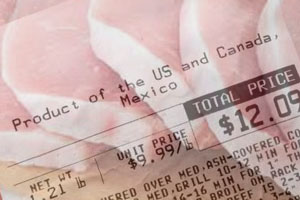CPC disappointed with COOL lawsuit

The Canadian Pork Council is disappointed to learn that the US District Court for the District of Columbia’s has denied a motion for a preliminary injunction in a lawsuit to block implementation of the US Department of Agriculture’s new (May 2013) final rule on country of origin labelling (COOL).
“The court’s denial of our request for a preliminary injunction is disappointing, but look forward to the arguments presented to the court about why the court should vacate this rule,” stated CPC’s Chair Jean- Guy Vincent. “Based on our consultations and analysis by our legal advisors the decision appears to be badly flawed, It is being recommended to us that we appeal the decision.”
This legal challenge represents a third channel by which the CPC is seeking a resolution to COOL and its discrimination against Canadian livestock exports. The CPC will continue to work closely with the Government of Canada to pursue a WTO compliance panel and with producers affected by COOL to prepare affidavits and witness statements that could lead to retaliatory tariffs if the revised US rule is not compliant with US WTO obligations. Secondly, CPC will continue to look for the US Congress to make a legislative change that would remove the discriminatory impact of COOL.
On July 8, a legal challenge was filed with the US District Court of the District of Columbia by members of the US and Canadian meat industry to stay USDA’s Mandatory Country of Origin Labelling (COOL) rule. The Canadian Pork Council (CPC) and the Canadian Cattlemen’s Association (CCA), along with several other US and Mexican livestock and meat organizations, are co-plaintiffs in this action.
Plaintiffs believe that a legislative change is required for the US to come into compliance with its WTO obligations on COOL. “The US Congress missed an opportunity to implement a legislative change to COOL in the farm bill deliberations,” added Vincent. “CPC has partnered with its US counterparts in the legal challenge to resolve this dispute as legislative options for the US to come into compliance with its WTO obligations become fewer.”











